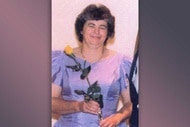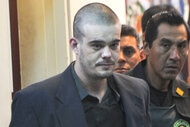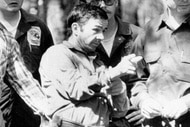Create a free profile to get unlimited access to exclusive videos, breaking news, sweepstakes, and more!
Scott Peterson's Defense Team Outlines "Orange Van" Theory in Their Latest Filing
The Los Angeles Innocence Project suggests that two local burglars could be responsible for Laci Peterson's murder.
Lawyers for Scott Peterson are continuing in their efforts to have new evidence retested in the controversial case.
On Tuesday, May 6, lawyers from the Los Angeles Innocence Project, which took on Peterson's case late last year, filed a new motion pressing the courts to allow retesting of evidence. They specifically asked to test a bloody mattress found in a burned van in the Modesto, California area the morning after Laci Peterson disappeared, local news station ABC7 reported.
The defense's filing comes after Stanislaus County prosecutors argued that new testing is not necessary to the case since the evidence was already retested in 2013 and 2019. The prosecutors wrote in their motion that those results were "fruitless," according to the Modesto Bee.
More from Oxygen.com:
Iowa Mom Shot 20-Year-Old "Neighbor Kid" Nine Times and Prosecutors Didn't Buy Her Home Invasion Claim
Army Vet Fatally Shot Man His Girlfriend Had Told Him Molested Her: "I Pulled the Trigger 7 or 8 Times"
Cold Justice Aids in Arrest of S.C. Couple Suspected of 2015 Halloween Quadruple Murder
Oxygen.com reached out to the Innocence Project for comment and did not hear back.
New Evidence?
In January 2024, the Innocence Project filed their first motion seeking "new evidence" from the original trial, arguing that it could prove Peterson was wrongly convicted. Their motion indicated that there were numerous evidentiary items they could not locate, potentially impacting Peterson's ability to defend himself and prove his innocence.
It was additionally revealed that the Innocence Project is looking into a potential connection to a December 2002 burglary that took place across the street from the Peterson home in Stanislaus County, as well as a van fire that took place in the Airport District on December 25, 2002.
The van is of particular interest to the defense as it was seemingly intentionally set on fire. Additionally, a bloodied mattress found inside the van is a piece of evidence they'd like to see entirely retested — instead of just a sample — through advanced DNA technology, per ABC7's recent report.
A court hearing will be held on May 29 to decide on the matter.
The Defense's Theory
The defense is testing the theory that Laci Peterson was abducted and thrown into an orange van while walking her dog the afternoon of December 24, 2002. Per the filing, multiple witnesses purportedly saw the pregnant woman walking her dog in the La Loma neighborhood, which would mean she was still alive when Scott Peterson left to go fishing at a nearby lake. The L.A. Innocence Project suggests in their January filing that, instead of Scott, two individuals who burglarized a home across from the Petersons' could've been the perpetrators, according to KRON4.
The defense additionally wrote in their January filing that there were multiple witnesses who reported seeing "an older '70s van" in the La Loma neighborhood on various occasions throughout December. However, sightings of the van ceased in the year following.
This theory has been brought up multiple times over the years, but authorities have long insisted that the robbery likely took place on December 26, about two days after Laci Peterson was last seen, according to a 2007 report by the Modesto Bee. The exact date of the robbery is unclear since the owners of the home were traveling from December 24-26. The burglars have additionally denied involvement in the crime.
Peterson currently remains behind bars for the murder of Laci and their unborn son, having been convicted by a jury in April 2004. He was originally handed a death sentence which was later reduced to life in prison without the possibility of parole after a Superior Court found that jurors were not properly screened for bias before they decided on his sentence.



















